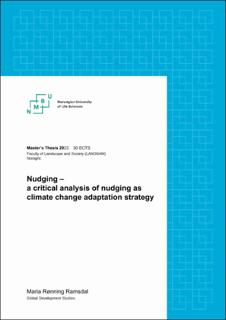| dc.description.abstract | The purpose of this study was to gain insight into the challenges with using nudge as a climate change adaptation strategy. This was done by applying the theoretical concepts of adaptation as a socio-political process, more precisely by focusing on authority, knowledge, and subjectivity. The study is a qualitative approach, based on a document analysis of selected literature discussing nudge and behavioral public policy generically and/or related to climate change/sustainability issues.
Relating to authority, this study found that nudge strategies are extensively spread globally but are predominantly found in western English-speaking countries. Especially western formal organizations, both governments and international (development/aid) organizations, have initiated nudge projects globally. As policy tool nudge should be considered as a soft governmental steering tool to change behavior, and must be combined with other stronger, more regulatory instruments. Relating to the concept of knowledge, the inherent choice architecture in nudge theory and practice and the ideal of scientific evidence-based knowledge was criticized for being a too limited approach to address larger societal problems. In regard to subjectivities, this study found substantial ethical issues that relate to the hidden and potentially manipulative features of nudges. This study also indicate that the ethical issues represent a severe democratic problem due to nudging being contradictory to empowerment and participation by individuals.
The challenges with using nudge as a climate change adaptation strategy were identified at two levels: individual and systemic. At individual level, particularly ethical issues are considered to be most prominent. At systemic level, nudge strategies are discussed as a soft governmental policy tool, considered as an inadequate or a modest contribution to address the complexity and seriousness of climate change problems. | |
